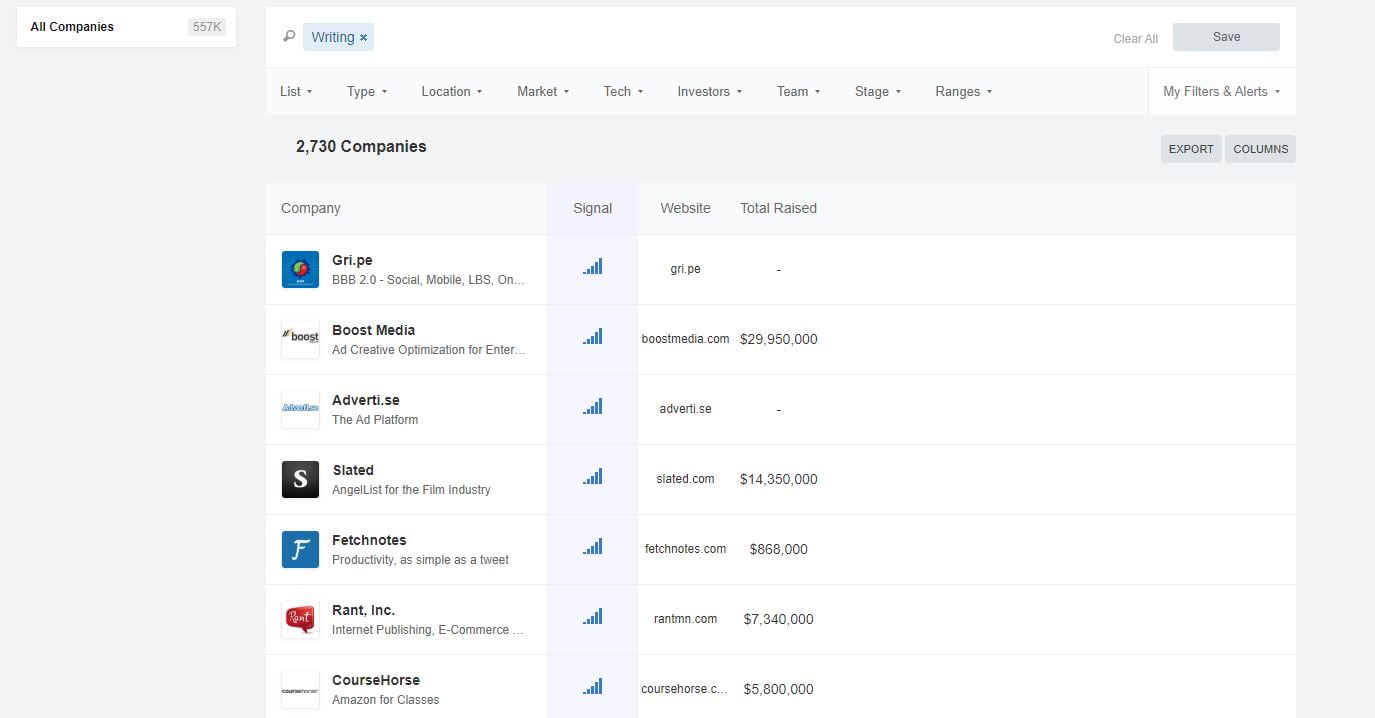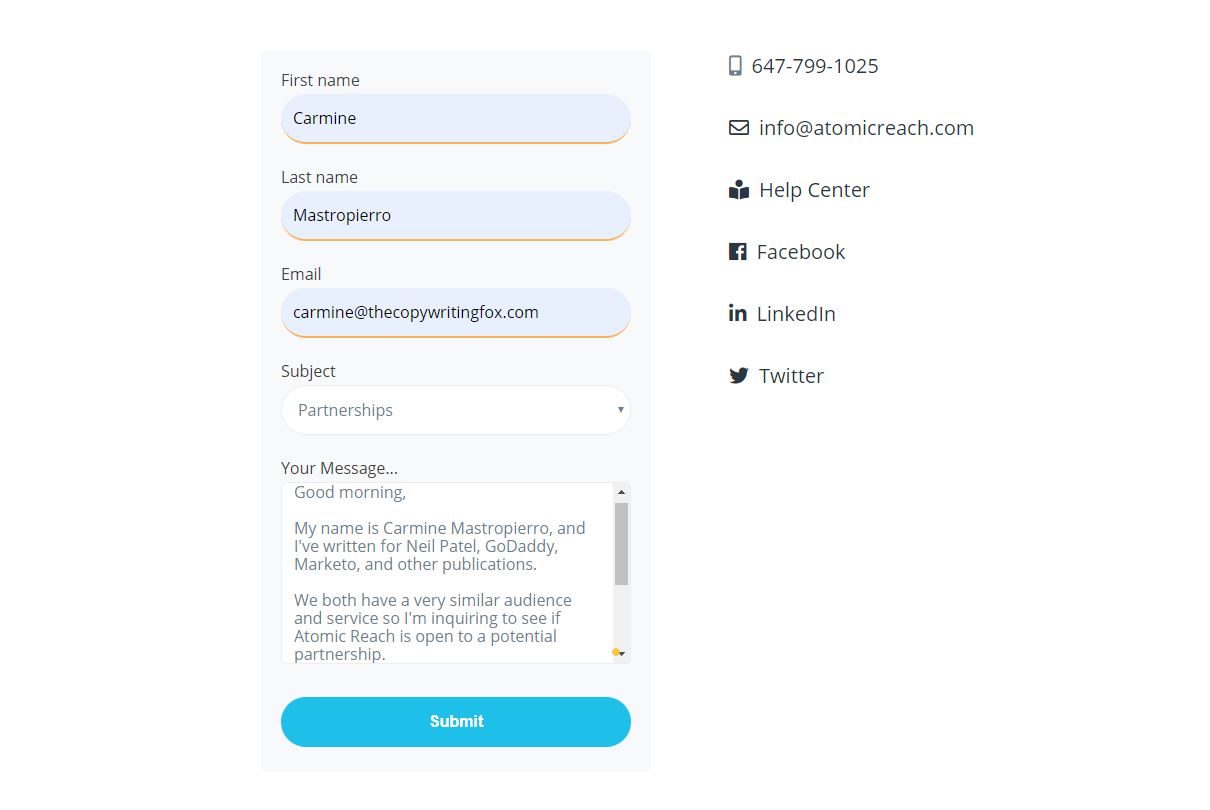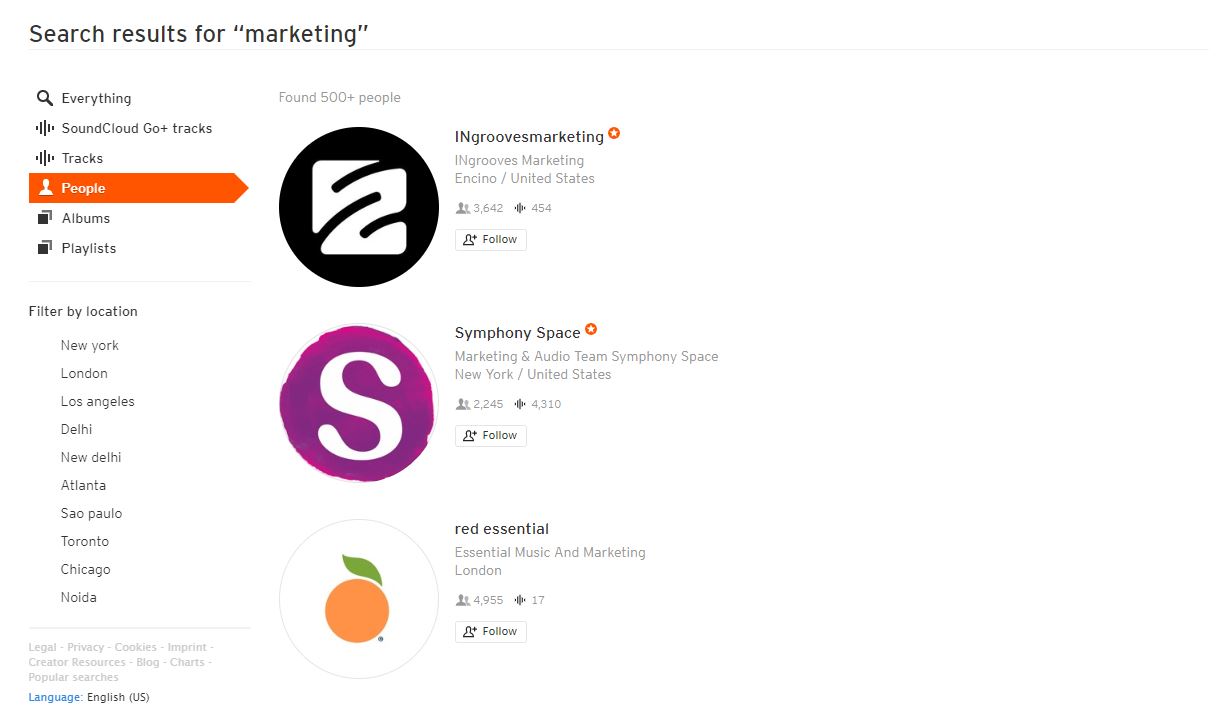Landing freelance writing jobs can be difficult.
There’s so much competition that standing out among hundreds of applicants seems impossible.
But, it’s actually a lot easier than you think.
What if you could consistently secure freelance writing gigs, and generate consistent income as a result?
How would your life change? Would you be able to pay the bills easier? Feel less stressed?
Great, keep those things in mind. Because I’m going to teach you 11 strategies for getting freelance writing jobs online that you can start doing today.
Crack your knuckles, and let’s get down and dirty.
What are online writing jobs?
Online writing jobs are exactly what you think they are: jobs and gigs that you do from home that are based on writing.
The exact material you write will depend on the client or company you work for.
Different types of online writing jobs include:
- Blog post writing
- Writing advertisements
- Creative writing
- Headline writing
- SEO writing
- Product description writing
- Technical writing
- Etc.
Naturally, the individual industry varies too. This means you might be writing for health, business, legal, travel, or another market.
Freelance writing online is ideal for anyone that wants to be in control of their life and income, break free from a traditional career, or has been laid off and needs money.
Are online writing jobs legit?
Absolutely. I have been a full-time copywriter for 8+ years and can tell you first-hand this is a legitimate industry and career path.
Nonetheless, it is easy to get scammed in the beginning if you aren’t careful.
This is because it’s common for new freelancers to not use contracts, take on any work, and forget to research each job.
Taking this precauintary steps will ensure that you always work with trusted companies and individuals. It also secures payment and gives you peace of mind.
Furthermore, you can make some big bucks with online writing gigs.
That brings me to my next point.
How much do online writing jobs pay?
There isn’t a one-size fits all answer for this.
I’d love to say “Online writing jobs pay X amount” but it can’t be done.
How much you earn will depend on things like:
- How much you charge.
- The client’s budget.
- How fast you work.
- How many jobs you take on.
- What industry the job is in.
- What type of writing you offer.
- Your genuine skill level.
- Etc.
I won’t leave you hanging though.
It’s common for beginner online writing positions to start at $0.05–0.10/word.
That means writing a 1,000 word article would equate to $50–100.
For inspiration, I charge anywhere from $100–250/hour for copywriting and content writing. So, yes, it can become very lucrative.
How to find online writing jobs
Try out these 11 ways to find online writing jobs that pay and I guarantee that you will hvae money-making opportunities lined up for you in the near future.
I’ve used all of these with raging success, securing paid online writing jobs that netted me thousands per month.
1. Cold calling 2.0
I know, I know. You probably almost puked when you read “cold calling.”
I don’t blame you. Cold calling has a very low conversion rate and is very tedious. For some, it’s outright scary.
Talking to strangers? Who wants to do that?
That’s why you need to invest in creating a cold calling 2.0 system.
Cold calling 2.0 was pioneered by the author Aaron Ross in his book Predictable Revenue. I read it a few months ago and my businesses have never been so profitable.
He also did an awesome interview with Alex Berman you should watch below when you have the time.
Aaron helped the CRM company Salesforce generate $100 million more in revenue each year by creating, just like the title suggests, a predictable revenue system.
The main components are:
- Consistent lead sources for continually filling your pipeline.
- A data-driven strategy for outreach and closing.
- Tools and plans for scaling these processes.
The problem with many entrepreneurs, especially in the service industry, is that they rely too much on referrals and whimsy approaches. They don’t have a plan to keep leads continually coming in.
Cold calling 2.0 creates a marketing machine — a practice that ensures that you will have always have freelance writing clients. No more droughts!
Aaron also talked about how you want to come off as a researcher, not a salesman. I get about two dozen emails a day from people pitching SEO and various services. They get deleted faster than how your highschool crush rejected you in freshman year.
It’s not that they aren’t good at what they do, but they try selling right away and you can tell their emails are copy and pasted. It’s not genuine and they clearly haven’t done their research on my business.
I pitch about 250 leads per week with my system, and one comment I always get is that out of all the similar emails they receive, mine was sincere and that’s what prompted a response.
You can read my cold emailing guide to get my template, subject lines, and more information to improve your own campaigns.
Even though many times it doesn’t work out, I get great referrals or they end up contacting me months later. Being a genuine and good person in business will take you a long way.
But enough with the sappy crap, here’s how you can put this into action.
Step 1: Identify your ideal lead
Who do you normally pitch? What niches do you enjoy writing the most about? What’s your expertise in?
You need to think about this because it creates a buyers persona — a personification of your ideal client. It looks as simple as this one:

Brainstorm things like:
- What industry they are in.
- What their position is (VP of marketing, CMO, etc)
- Why they need a freelance writer.
- What their goals, strengths, and weaknesses are.
- What kind of questions they’d be asking about writing.
- What topics they are interested in.
Don’t worry if you lack the data to create one that’s extremely accurate. That will come with time and experience. Just get something down to use a reference for now.
Step 2: Get their contact information
There are a million in one ways to do this, but I’d highly recommend checking out LeadFerret. I’ve mentioned them in another article, and they’re a great free tool for developing any outbound sales system.
It’s a database of literally any industry or company you could imagine. Begin by signing up for a free account here.

Now here’s where you buyers persona steps in. Since you’re looking to pitch a writing service, you want to find who would be in charge of that. Normally it’s a CMO, VP of marketing, marketing director, or similar roles.
Filter LeadFerret by title, department, and look up an industry code if you’d like to pitch a very specific niche.

This will yield hundreds of thousands of leads. Literally years worth or more of potential clients.
If you want to download them for convenience, you’ll have to pay or input information to earn points. But, you can also just take the manual approach.

Click on any record and it will display company details, social links, and contact information. Type the email into a spreadsheet to stay organized, and double check that you enter it correctly. You don’t want to email the wrong person.
Repeat this process until you have 25 to 50 leads.
Step 3: Send a personalized pitch
Now it’s time to create relationships with these leads and get your foot in the door.
I highly recommend investing into a professional email from Zoho or Gmail, like yourname@yourdomain.com.
This helps with credibility and people will take you more seriously.
The goal of the first email is to simply ask if you’re speaking to the right individual or if you can get be referred to them. It should look like this:

If you contacted the right individual, they will usually respond by asking how they may help you. That’s when you send a personalized pitch like this:

If they’re interested, schedule a phone call. Get them talking about their content goals, experience with freelance writers, and ultimately tie in you how you can help them grow through writing.
I recommend reading my previous blog post on 10 cold calling tips to improve the odds you convert leads over the phone, too.
2. Job boards
It doesn’t matter if you’re a beginner or a veteran, job boards can be a great way to find freelance writing jobs from home.
Once your portfolio hits critical mass, you’ll be able to snag any gig you have your sights on, too.
The reality is that most people pitching job boards have little to no experience or aren’t native English speakers.
I know from experience. Trust me.
Even if you have a few pieces of work to show, you’re already miles ahead of most writers.
Here are some freelance writing job boards to keep an eye on.
ProBlogger
Easily the most well known job board. You’ll find a range of low to high paying work on here in a wide variety of niches.
I’ve always liked that they charge businesses to create listings. This weeds out scams and low paying clients.
Always ensure that you thoroughly read the job descriptions. Some say to email them with a resume, rates, etc — not apply through ProBlogger itself.
You’d be surprised how many writers don’t take the few seconds just to read the gig outline. It’s costing them serious money.
There are new freelance writing jobs posted on a daily basis, so tune in every morning to be one of the first to apply.
BloggingPro
This gig site isn’t as active as ProBlogger, but it still has very high quality opportunities. You’ll usually find one or two new gigs on it per day.
You can filter it by category, keywords, location, and job type to find exactly what you want, as well.
BloggingPro also enforces a minimum wage of $15/hour and content no shorter than 500 words.
Freelancewriting.com
Established in 1997, this is one of the longest running freelance job boards in the world. They list blogging, copywriting, journalism, and many other job types.
It’s constantly updated, so you’ll always have a fresh stream of potential writing jobs at your fingertips.
They offer a great filtering system, too. You can narrow it down to the exact location, required skills, and even the job source.
3. Reddit
They say that there’s a subreddit for everything. And they’re right!
There are many freelance related subreddits you can use to find remote freelance writing jobs. I took the time to narrow down a bunch of them to save you time. Check these out:
- /r/hiring
- /r/forhire
- /r/b2bforhire
- /r/jobbit
- /r/writersforhire
- /r/freelance_forhire
- /r/hireawriter
- /r/Writingjobboard
Look for posts that have the “Hiring” tag. Click them, and just like a job board, read the thread carefully. It will outline the scope of work, payment, and other information.

Send them a private message with a pitch that includes:
- Your skills
- Your writing experience
- Portfolio pieces
They might also ask for your rate or turnaround time, which you should also have decided to keep the process flowing smoothly.
And please. Always, always, always use a freelance writing contract. I hear about freelancers getting scammed for their hard work way too often. Even a quick one page agreement is more than enough to cover grounds for payment, termination, etc.
I also suggest reading my article on the best freelance websites to secure more online writing jobs.
4. Tweets from job boards
Twitter is one of the most effective social media sites for connecting with people. It’s all about having conversations, and you can use it for finding paid online writing jobs, as well.
Fun fact: Twitter has the capabilities to handle 18 quintillion accounts. Yep, that’s a real number.
But, so many writers are missing out by just letting their social accounts sit there unused.
Don’t be one of them anymore.
There are several job boards that constantly tweet out the latest opportunities that you need to follow.

Check out these accounts specifically:
5. Use Linkedin to find clients and jobs
LinkedIn has over 500 million users. A.K.A, over 500 million people you can pitch 😉
It’s a priceless platform for growing your brand, generating clients, and nurturing relationships.
And it all starts with a great profile. Robert Tran schools us on how to do this.

Note that he has a professional profile picture and kept the stock cover photo. This isn’t Twitter or Facebook, so don’t add a picture of you and your friends at the bar.
If you don’t have high quality photos, hire a local photographer. It will be one of the best ways you spend money. I guarantee it.
Robert also has a great one sentence introduction that sums up his experience and main practice.
Past this, he name drops some very impressive clients like JP Morgan and HSBC.
Make sure that everything is filled out on your profile. Work, education, skills, accomplishments, etc. This will create a better first impression and allows increases your chance of being found through Linkedin’s search engine.
Now it’s time to find some leads. Remember your buyers persona? Open up that bad boy and start searching for lead content writers, editor in chiefs, vice presidents of marketing, and similar roles.

A quick search for “CMO” gave me tons of potential people to reach out to. Hit that connect button and include a message that tells them about your writing services. Mention any experience or notable clients to increase response rates.
Besides pitching potential clients, you can also search for freelance writing jobs directly. Where? The tab that says “Jobs”, dummy!
Search for keywords like copywriter, content writer, and similar. You will have tons of full time, part time, and contract positions to sift through.

You can apply with your Linkedin account — hence why it’s important to spend time making it impressive. Make sure you attach a resume, as well. I like using VisualCV to create professional looking resumes and recommend giving them a try.
6. Leverage your network
Everyone has a network. Heck, 85% of jobs are filled through networking alone and freelancing is no different.
Even if it’s just your dog or your mom, there’s bound to be some people you can spread the word to that you offer writing services.
I’m not sure if old Fido needs blog posts, but maybe your uncle who runs that dental practice does.
Audit the following and I’m sure you’ll come up with a bunch of people you could be contacting:
- Numbers in your cell phone.
- Email addresses you have saved.
- Connections on social media.
- Business cards in your wallet.
Is there anybody that you believe could use your writing services? Give them a call or shoot them an email explaining what you do. And focus on the benefits they’ll receive.
Let’s say that you offer copywriting. Talk about how you’ll help them get more clients, generate more revenue, and get people excited about their business; don’t just state what you do.
7. Hit some local networking events
If there’s one thing that utterly transformed my business life, it was networking.
I’m talking shaking hands, grabbing coffee, and exchanging business cards. It’s lead me to so many great opportunities, grew my local reputation, and I’ve made some awesome friends along the way.
Everyone that offers writing needs to network. Otherwise you’re just leaving money on the table.
And networking is a lot simpler than you think. I’d recommend searching for keywords like business, marketing, or tech on Meetup.com, and navigating to the calendar section.

This displays all of the upcoming events, how many members are attending, and what time it begins.
I personally love going to big events because I can meet more people and the energy is more lively.
But, meetups where there are a dozen or two people are cool, too.
It makes the event more intimate, as you get to know each other better versus spending less time with a higher number of people. Both have their merit.
Once you’ve found some events you’d like to attend, follow these rules for the best results:
- Dress to impress: You don’t have to be fully suited up, but wear a dress shirt and nice shoes. Business casual is always acceptable. Get a fresh haircut if you’d like, and cut that Gandalf beard while you’re at it.
- Business cards: This isn’t a 90’s sitcom. No one is going to be writing down your email or number on their hand with a pen. You need business cards if you want people contacting you and referring you work. I like Vistaprint. You get tons of cards for a very affordable price, and there’s an insane amount of design options.
- Don’t be nervous: Most people at networking events are nervous, so don’t worry if you are, too. Crack a smile, shake hands, and ask others they do for a living. Be yourself and don’t get too stiff. You want to be a fun person to be around and to work with.
8. Show the world how great of a writer you are
Imagine having writing clients organically flooding your inbox.
You wake up, make your morning coffee, and you have new project proposals waiting for you every day.
It sounds like a pipe-dream, but it’s the reality for a lot of writers. How can you achieve this yourself? Inbound marketing.
93% of companies use some form of inbound marketing right now.

I’d say it’s the future, but that’d mean we’re living in the future right now.
Some of the biggest companies and marketers are doubling down on the main component of inbound: content.
Blog posts, YouTube videos, and podcast episodes are the go-to for many.
The concept is simple, too. If you create content that’s geared towards your buyers persona, you attract high quality prospects to your website or other platforms. Mix that with a lead generation funnel, and inbound marketing can have serious power.
I recommend building a blog to begin. Post at least once per week, but more if possible. Focus on long form content that teaches your audience valuable skills and information. Just like this article, right? 🙂
9. Guest post on other websites
If you’ve ever read a backlink building guide, you know that guest posts are usually the first recommended strategy.
They drive referral traffic to your website, build authority, and help you create relationships with other webmasters.
As a freelance writer, there’s one extra benefit: they help you get work.
Think about it.
You guest post on a big publication and another business owner enjoys your style of writing. They click the link in your biography section that leads them to your website, and they contact you to talk about a project.
Let’s get the ball rolling. Head over to Google and use the following operators to find guest post opportunities.
- inurl:guest-posting-guidelines + keyword
- inurl:become-a-contributor + keyword
- inurl:guest-post + keyword
The inurl operator will filter your Google results to only display that exact URL. The keyword should be related to your niche, and I recommend trying different variations to find as many sites as possible.

Visit these sites and read their guest post guidelines carefully. All of them should offer a biography section with a link to your website and social media. Not all include a do-follow backlink, but that’s alright. The main goal is exposure.
If everything checks out, send them a pitch. It needs to have a good introduction about you as a writer and a few topic ideas.
In the case that they accept one of your ideas, write the piece and send it in! You should see your article live in a few days or weeks, depending on their content schedule.
You can also read my list of websites that accept guest posts or magazines looking for writers to find more publications to pitch.
10. Receive sub-contracted work from agencies
One of the toughest parts when learning how to find legitimate writing jobs is getting the work in the first place, right?
That’s where this next technique shines. 🌞
You can skip the entire client acquisition process by partnering up with another marketing agency (or a similar company) and taking on their overflow.
This means when they have too much work to handle, they hand it off to you to finish.
Conveient, huh?
You will have online writing opportunities handed to you organically.
Here’s how to do it:
Step 1: Find businesses that could be potential partners
You’re looking for partners that can hand you online writing jobs, so naturally writing-based businesses make a great fit.
Visit Angel List’s company section and search for a keyword like “writing.”

Click the website URL of any company that looks promising.

Move onto the second step after this.
Step 2: Send them a personalized outreach
Navigate to the contact page for each potential partner. It is normally found in the main navigation or footer.
Send a personalized pitch using the following template:
Good morning,
My name is Carmine Mastropierro, and I’ve written for Neil Patel, GoDaddy, Marketo, and other publications.
We both have a very similar audience and service so I’m inquiring to see if Atomic Reach is open to a potential partnership.
I could happily complete any overflow work your agency has to ensure you meet deadlines and satisfy clients.
I’m open to other ideas and your feedback as well.
Warm regards,
Carmine

Companies that are interested in working with you will schedule a time to chat on the phone.
Use this as a chance to learn more about each other, discuss payment rates, scope of work, and other important details.
11. Grow a podcast
I don’t know about you, but I love listening to podcasts when I’m working, exercising, or cooking.
It’s a great way to learn something while passing the time.
Oh, and it’s also an excellent way to generate inbound leads. 🙂
Podcasting is heavily on the rise too. 50% of all households in America know what a podcast is.
You don’t need a big fancy studio to start growing a podcast that lands you online writing gigs, either. Follow the below steps instead.
Step 1: Get the right equipment
All you need to begin podcasting is a microphone and software for recording audio.
There are many affordable microphones you can invest in like Blue Yeti or Lavalier.
I personally have a clip-on Lavalier mic that makes it very convenient to record on the go or anywhere I want.
Depending if you plan to record from one location or not will determine the type of microphone you need.
Secondly, Audacity is a free recording software you can use to record podcasts, edit them, and export as various file types.
Step 2: Brainstorm topics
With the equipment and software out of the way, it’s time to brainstorm some podcast topics!
One of the best ways to do so is by taking existing content (such as blog posts) and turning those into podcast episodes.
You can use the blog post as a pseudo-script and further elaborate on the main points.
This saves you from having to spend hours or more coming up with brand new ideas.
However, eventually you will need to do that.
I recommend checking out competitors for brain food.
Head over to any major podcasting platform like Spotify or Soundcloud and type in a keyword.

Then, go through popular podcasts and note what topics they speak about.

Use these as inspiration and think of ways to put a unique twist on them so you aren’t directly copying competitors.
Since you’re using podcasting as a way to generate leads, focus on writing-related topics to attract a hyper-relevant audience, as well.
Step 3: Publish your first episode!
Equipment. ✅
Software. ✅
Episode ideas. ✅
It’s now time to record your first episode.
Be yourself, don’t read scripts word-for-word, and make it as useful as possible for the audience.
You’re going to make mistakes, stutter, and mess some parts up. That’s normal.
Keep going and edit out any errors with Audacity later.
After you have a finished product, I suggest uploading it to all of the major platforms like:
- Spotify
- iTunes
- Google Play
- Soundcloud
- Stitchr
Better yet, upload it to one and connect the RSS feed to the others so it automatically syndicates there. This will save you heaps of time.
Keep up a regular publishing schedule to build a fan base and see the maximum return over time.
Final thoughts on online writing jobs
Writing online to make money is awesome.
You get to work from home, making a living working for yourself, and gain a level of freedom few will ever experience.
Nonetheless, securing constant gigs and jobs is tough.
You can easily land yourself in a drought where you have little to no income or opportunities.
That is, of course, unless you apply the strategies and lessons you learned today. 🙂
Enough reading already. Go out there and get some new clients!














